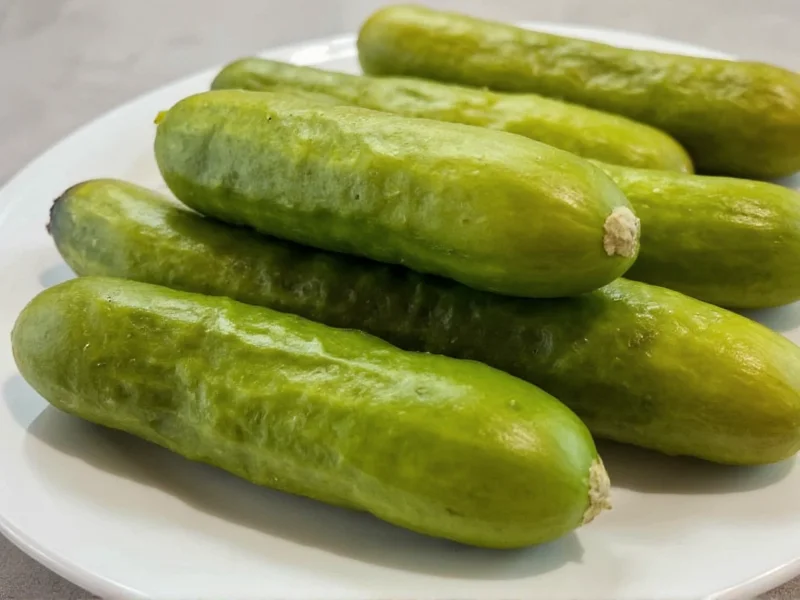Understanding the relationship between cucumbers and pickles requires examining both the botanical facts and culinary processes involved. While all pickles start as cucumbers, not all cucumbers qualify as pickles. The transformation occurs through a deliberate preservation method that changes the cucumber's texture, flavor, and shelf life.
The Science Behind Pickling
Pickling represents one of humanity's oldest food preservation techniques, dating back thousands of years. This process fundamentally alters cucumbers through either fermentation or acidification:
- Fermentation pickling: Cucumbers submerge in a saltwater brine, allowing naturally occurring bacteria to convert sugars into lactic acid over several days or weeks
- Vinegar-based pickling: Cucumbers immerse in a solution of vinegar, water, and spices, with acid immediately preserving the vegetable
During this transformation, cucumbers undergo significant chemical changes. The acid or lactic acid lowers the pH, creating an environment inhospitable to harmful bacteria while developing the characteristic sour flavor. Simultaneously, the cucumber's cell structure changes, resulting in the firm yet tender texture associated with quality pickles.
Key Differences Between Cucumbers and Pickles
| Characteristic | Raw Cucumber | Pickle |
|---|---|---|
| Texture | Crisp, watery flesh | Firm, slightly chewy texture |
| Flavor Profile | Mild, slightly sweet | Tangy, sour, often spiced |
| Shelf Life | 1-2 weeks refrigerated | Months to years when properly sealed |
| pH Level | 5.1-5.7 (less acidic) | 3.2-3.6 (highly acidic) |
| Nutritional Content | Higher vitamin K, more water content | Reduced nutrients, higher sodium content |
Common Misconceptions About Cucumbers and Pickles
Several widespread misunderstandings contribute to the confusion about whether cucumbers are pickles. Many people believe that any cucumber automatically becomes a pickle over time, but this represents a fundamental misunderstanding of the pickling process. Without the deliberate introduction of acid or salt brine, cucumbers simply rot rather than transform into pickles.
Another frequent misconception involves the term "pickle" itself. While in North America, "pickle" typically refers specifically to pickled cucumbers, globally the term applies to any preserved vegetable. This linguistic difference sometimes creates confusion when discussing whether all pickles are cucumbers (they're not—there are pickled onions, carrots, and other vegetables).
Types of Cucumbers Used for Pickling
Not all cucumber varieties work equally well for pickling. Specialty pickling cucumbers differ from slicing cucumbers in several important ways:
- Pickling cucumbers: Shorter, thicker-skinned varieties like Kirby cucumbers that maintain crispness during preservation
- Slicing cucumbers: Longer varieties with thinner skins, better for fresh consumption but often become too soft when pickled
- Gherkin cucumbers: Tiny cucumbers specifically cultivated for pickling, often used for cornichons
The ideal cucumber for pickling features a firm texture, minimal seeds, and blemish-free skin. These characteristics ensure the final product maintains the desirable crunch that defines quality pickles. Commercial pickle producers often add calcium chloride or grape leaves to their brine to preserve crispness throughout the pickling process.
The Transformation Timeline
Understanding how long it takes for a cucumber to become a pickle helps clarify why fresh cucumbers don't automatically qualify as pickles. The transformation occurs in distinct stages:
- Refrigerator pickles: Ready in 24-48 hours but continue developing flavor over weeks
- Fermented pickles: Require 1-6 weeks for complete transformation through natural fermentation
- Canned pickles: Processed immediately but need 1-2 weeks for flavors to fully develop
This timeline demonstrates that pickling represents an intentional process rather than an automatic transformation. Without human intervention introducing the proper preservation elements, cucumbers simply deteriorate rather than becoming pickles.
Why the Confusion Persists
The persistent question are cucumbers pickles stems from several factors in modern food culture. Marketing language often blurs the distinction, with products labeled simply as "pickles" without clarifying they're specifically pickled cucumbers. Culinary shorthand further compounds the confusion, as recipes might list "pickles" as an ingredient without specifying they require the preserved product rather than fresh cucumbers.
Additionally, the visual similarity between small cucumbers and certain pickle varieties creates misunderstanding. Gherkins, for example, refer to both a specific small cucumber variety and the pickled product made from them. This dual usage of terminology contributes significantly to the ongoing confusion about the difference between cucumbers and pickles.











 浙公网安备
33010002000092号
浙公网安备
33010002000092号 浙B2-20120091-4
浙B2-20120091-4